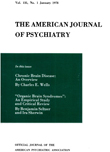A CONTROLLED STUDY OF PERSONALITY RELATIONSHIPS IN MOTHERS OF SCHIZOPHRENIC MALE PATIENTS
Abstract
1. Twenty-five mothers of hospitalized schizophrenic male patients (experimental group) and 25 mothers of nonhospitalized and nonschizophrenic males (control group) were interviewed and Rorschachs administered. There was little demonstrable difference in the life histories between these 2 groups, except a more frankly critical attitude and a more gregarious interest on the part of our control group.
2. The Rorschach data suggested a higher level of drive and a more outgoing adjustment in our control group.
3. The personality data evidenced a more ambitious, aggressive, and successful feeling as individuals, in the control mothers. This, we feel, had resulted in a more free and realistic relationship with their sons.
4. While on superficial examination it would appear that the patients' mothers are "overprotective and oversolicitous," they did not demonstrate these characteristics as such in this study. We feel that their lack of being persons in their own right may have caused them to live out their own emptiness in the lives of their stand-in sons, in so far as the sons had permitted this.
5. The therapeutic implication of this study is that an independent life for the mother is indicated in order for the son to have a life of his own.
6. This study provided no information as to how the sons had reacted to their mothers' attitudes, nor any estimate of what other stresses might have been significant in their illness. Furthermore, this study did not show that the observed differences were indigenous to schizophrenia.
Access content
To read the fulltext, please use one of the options below to sign in or purchase access.- Personal login
- Institutional Login
- Sign in via OpenAthens
- Register for access
-
Please login/register if you wish to pair your device and check access availability.
Not a subscriber?
PsychiatryOnline subscription options offer access to the DSM-5 library, books, journals, CME, and patient resources. This all-in-one virtual library provides psychiatrists and mental health professionals with key resources for diagnosis, treatment, research, and professional development.
Need more help? PsychiatryOnline Customer Service may be reached by emailing [email protected] or by calling 800-368-5777 (in the U.S.) or 703-907-7322 (outside the U.S.).



